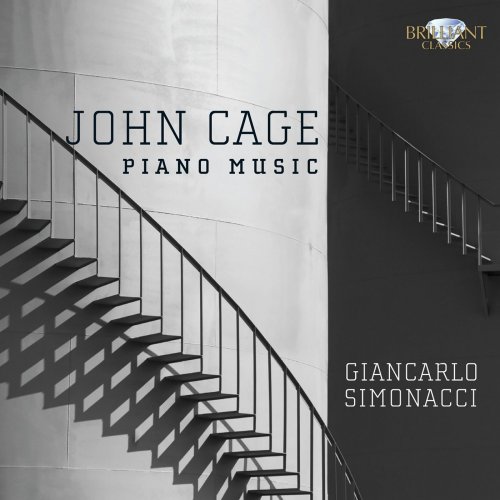
Giancarlo Simonacci - Cage: Piano Music (2010)
BAND/ARTIST: Giancarlo Simonacci
- Title: Cage: Piano Music
- Year Of Release: 2010
- Label: Brilliant Classics
- Genre: Classical
- Quality: FLAC (tracks)
- Total Time: 03:17:12
- Total Size: 580 mb
- WebSite: Album Preview
Tracklist:
Three Easy Pieces (1933)
1-1 Round 1:56
1-2 Duo 0:42
1-3 Infinite Canon 0:33
1-4 Quest (1935) 0:47
Metamorphosis (1938)
1-5 I. 2:16
1-6 II. 2:37
1-7 III. 5:05
1-8 IV. 1:14
1-9 V. 2:27
1-10 Jazz Study (1942) 2:34
Tripled Paced (First Version, 1943)
1-11 I. 0:56
1-12 II. 0:51
1-13 III. 0:33
1-14 Ad Lib (1943) 3:00
1-15 Soliloquy (1945) 2:32
1-16 Ophelia (1946) 6:19
Two Pieces (1946)
1-17 I. 3:37
1-18 II. 3:42
1-19 In A Landscape (1948) 7:58
1-20 Dream (1948) 6:13
Suite For Toy Piano (Version For Piano, 1948)
1-21 I. 1:17
1-22 II. 1:28
1-23 III. 1:10
1-24 IV. 1:33
1-25 V. 0:52
Seven Haiku (1951)
1-26 I. 0:13
1-27 II. 0:11
1-28 III. 0:23
1-29 IV. 0:16
1-30 V. 0:24
1-31 VI. 0:18
1-32 VII. 0:20
1-33 For M.C. And D.T. (1952) 0:48
1-34 Waiting (1952) 3:38
Socrate (Drame Symphonique En Trois Parties)
2-1 I. Portrait De Socrate (Le Banquet) 6:28
2-2 II. Bords De L'Iliussus (Phèdre) 6:52
2-3 III. Morte De Socrate (Phédon) 15:37
Cheap Imitation (1969)
2-4 I. 6:03
2-5 II. 9:02
2-6 III. 16:08
Etudes Boreales (1978)
Solo Piano
3-1 I. 5:36
3-2 II. 5:31
3-3 III. 5:38
3-4 IV. 5:38
Solo Cello
3-5 I. 5:28
3-6 II. 5:40
3-7 III. 5:29
3-8 IV. 5:37
Cello And Piano
3-9 I. 5:45
3-10 II. 5:44
3-11 III. 5:39
3-12 IV. 5:44
Performers:
Marco Simonacci (cello)
Giancarlo Simonacci (piano)
Gabriella Morelli (piano)
Three Easy Pieces (1933)
1-1 Round 1:56
1-2 Duo 0:42
1-3 Infinite Canon 0:33
1-4 Quest (1935) 0:47
Metamorphosis (1938)
1-5 I. 2:16
1-6 II. 2:37
1-7 III. 5:05
1-8 IV. 1:14
1-9 V. 2:27
1-10 Jazz Study (1942) 2:34
Tripled Paced (First Version, 1943)
1-11 I. 0:56
1-12 II. 0:51
1-13 III. 0:33
1-14 Ad Lib (1943) 3:00
1-15 Soliloquy (1945) 2:32
1-16 Ophelia (1946) 6:19
Two Pieces (1946)
1-17 I. 3:37
1-18 II. 3:42
1-19 In A Landscape (1948) 7:58
1-20 Dream (1948) 6:13
Suite For Toy Piano (Version For Piano, 1948)
1-21 I. 1:17
1-22 II. 1:28
1-23 III. 1:10
1-24 IV. 1:33
1-25 V. 0:52
Seven Haiku (1951)
1-26 I. 0:13
1-27 II. 0:11
1-28 III. 0:23
1-29 IV. 0:16
1-30 V. 0:24
1-31 VI. 0:18
1-32 VII. 0:20
1-33 For M.C. And D.T. (1952) 0:48
1-34 Waiting (1952) 3:38
Socrate (Drame Symphonique En Trois Parties)
2-1 I. Portrait De Socrate (Le Banquet) 6:28
2-2 II. Bords De L'Iliussus (Phèdre) 6:52
2-3 III. Morte De Socrate (Phédon) 15:37
Cheap Imitation (1969)
2-4 I. 6:03
2-5 II. 9:02
2-6 III. 16:08
Etudes Boreales (1978)
Solo Piano
3-1 I. 5:36
3-2 II. 5:31
3-3 III. 5:38
3-4 IV. 5:38
Solo Cello
3-5 I. 5:28
3-6 II. 5:40
3-7 III. 5:29
3-8 IV. 5:37
Cello And Piano
3-9 I. 5:45
3-10 II. 5:44
3-11 III. 5:39
3-12 IV. 5:44
Performers:
Marco Simonacci (cello)
Giancarlo Simonacci (piano)
Gabriella Morelli (piano)
Recording: June 2009, Fazioli Hall, Sacile, Italy
John Cage (1912–92) is regarded as one of the most influential and controversial composers of the 20th century. It is not only his music that this reputation is based on – his ideas were revolutionary, and he cast doubt on the supremacy of European art, and music when it was unchallenged and such views were considered heretic. Cage rejected the status held by harmony, instrumentation, and even the development of music from one point to another. He disconnected harmony from rhythm to liberate western music from its hitherto privileged hierarchies – iconoclastic stuff for 1940s America!
Cage studied with Schoenberg in Los Angeles, and although he adopted the 12-tone technique he abandoned Schoenberg’s expressionist style. Cage was also influenced the maverick composer – Erik Satie.
Satie had also ridiculed the musical establishment, and Cage arranged Satie’s longest work Socrate (a monodrama for piano and voice) for two pianos. It is worth mentioning that Cage’s favourite Satie composition was Vexations, a short work for piano, with instructions that it may be performed 840 times without pause or change.
Recording made in 2009.
Important repertoire and an ideal introduction to John Cage.
John Cage (1912–92) is regarded as one of the most influential and controversial composers of the 20th century. It is not only his music that this reputation is based on – his ideas were revolutionary, and he cast doubt on the supremacy of European art, and music when it was unchallenged and such views were considered heretic. Cage rejected the status held by harmony, instrumentation, and even the development of music from one point to another. He disconnected harmony from rhythm to liberate western music from its hitherto privileged hierarchies – iconoclastic stuff for 1940s America!
Cage studied with Schoenberg in Los Angeles, and although he adopted the 12-tone technique he abandoned Schoenberg’s expressionist style. Cage was also influenced the maverick composer – Erik Satie.
Satie had also ridiculed the musical establishment, and Cage arranged Satie’s longest work Socrate (a monodrama for piano and voice) for two pianos. It is worth mentioning that Cage’s favourite Satie composition was Vexations, a short work for piano, with instructions that it may be performed 840 times without pause or change.
Recording made in 2009.
Important repertoire and an ideal introduction to John Cage.
As a ISRA.CLOUD's PREMIUM member you will have the following benefits:
- Unlimited high speed downloads
- Download directly without waiting time
- Unlimited parallel downloads
- Support for download accelerators
- No advertising
- Resume broken downloads


